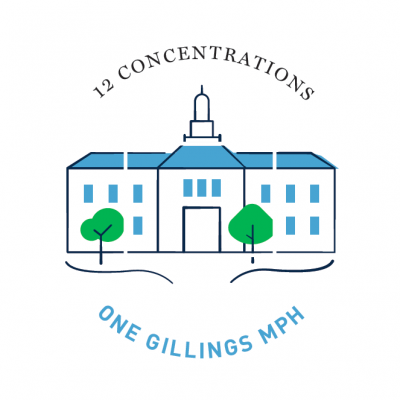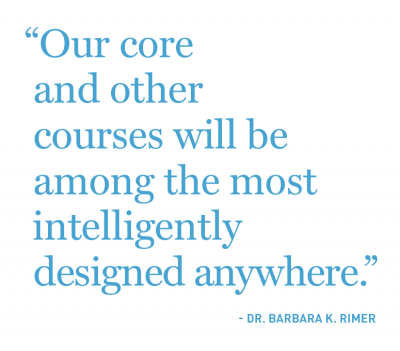From the Dean (Fall 2018)
October 8, 2018

Dean Barbara K. Rimer
Dear readers —
We are energized by the work our dedicated faculty and staff are doing, with substantial input from students, to examine, re-imagine and re-engineer our academic degrees, especially the Master of Public Health (MPH). While schools around the world are making changes, partly in response to our accreditor’s 2016 guidelines, we’re doing it with our unique Gillings stamp.
This issue of Carolina Public Health is devoted to sharing the story of our academic journey, with special focus on the MPH – the foundational public health degree.
Why we are changing
The MPH is a practice degree that evolved over nearly 80 years at the Gillings School, and longer nationally, in response to societal trends, advances in research and changing views of public health. The classic MPH degree – the one I, many of our readers and thousands of Gillings School alumni attained – has served us well. I’m proud of the training we and other schools of public health have provided. As public health has grown in stature, and our School’s reputation has grown, the value of our MPH degrees has grown.
One marker of that value is our amazing track record. Within one year of graduation, 99 percent of our graduates either have jobs or plans for more education. To maintain that record, we must prepare students for the rapidly evolving world they will inherit, with the knowledge and skills employers need. We want to give students more than degrees and jobs; we want them to have a spectacular education that will last a lifetime, even as knowledge and fields evolve.
 Several factors converged to shift thinking about the MPH. After a multi-year process of national assessment, in which many of us participated, our accreditor issued new guidelines that freed us from many old ways of operating (e.g., dividing learning needs into five core disciplines), while making us more accountable for students’ achievement of predefined competencies.
Several factors converged to shift thinking about the MPH. After a multi-year process of national assessment, in which many of us participated, our accreditor issued new guidelines that freed us from many old ways of operating (e.g., dividing learning needs into five core disciplines), while making us more accountable for students’ achievement of predefined competencies.
Employers from public- and private-sector organizations want students to demonstrate skills in cultural competence, data visualization, teamwork, budgeting, communication and other areas, in addition to domain skills. Students also gave us a lot of feedback. Many wished the MPH courses – the five disciplinary courses they all took – gave them more opportunities to work with students across the School.
To solve some of public health’s most challenging problems, such as the opioid epidemic, obesity, cancers and heart disease, emerging infections and lack of access to clean water, our graduates will work in interdisciplinary teams across North Carolina and around the world. Why not train them in teams and let them solve real problems while they are students?
This convergence for change led to an 18-month process at the Gillings School, in which teams of faculty, staff and students imagined the future state for core courses taken by all MPH (and many other) students. Planning intentionally, the teams meticulously devised integrated core courses in which students from across the School come together. Students work under the direction of committed faculty members, often teaching in teams, using state-of-the-art teaching methods, and supported by specially selected and trained teaching assistants and fellows.
In interdisciplinary teams, the faculty leaders cover didactic information, but they also, for example, will use live data to learn in-depth about a community and then propose solutions to a public health challenge. Students will acquire basic knowledge and skills in understanding populations and use analytic tools to characterize risk. We are connecting information to skills building and practice, using the kinds of data and problems our graduates will experience in the world beyond graduate school. Among other products, they will write white papers and present potential solutions and evaluation strategies.
New core courses were launched in fall 2018. We are fine-tuning them continually.
 Instead of offering only department and discipline-focused MPH degrees, we’ll have one MPH degree, the Gillings MPH, with 12 concentrations (see page 12), several of which are cross-departmental. Each has been built or rebuilt for the 21st century, assuring relevance. Several concentrations will be offered both in the full-time residential program and in an online format, accessible to part-time students.
Instead of offering only department and discipline-focused MPH degrees, we’ll have one MPH degree, the Gillings MPH, with 12 concentrations (see page 12), several of which are cross-departmental. Each has been built or rebuilt for the 21st century, assuring relevance. Several concentrations will be offered both in the full-time residential program and in an online format, accessible to part-time students.
Gillings School students always have gotten – and will continue to get – outstanding training. All our students will acquire rigorous, carefully designed education for the 21st century. Our core and other courses will be among the most intelligently designed anywhere.
The process has been intense, challenging and stressful, but our students deserve the best. We are looking forward to completing the challenge and launching all 12 new concentrations in 2019.
The MPH for the 21st century? We’re on it!
Warm regards,
Barbara K. Rimer, DrPH
Carolina Public Health is a publication of the University of North Carolina at Chapel Hill Gillings School of Global Public Health. To view previous issues, please visit sph.unc.edu/cph.
